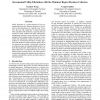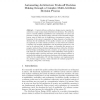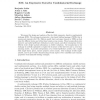33 search results - page 3 / 7 » Complexity of terminating preference elicitation |
IJCAI
2003
13 years 6 months ago
2003
Utility elicitation is a critical function of any automated decision aid, allowing decisions to be tailored to the preferences of a specific user. However, the size and complexit...
ECAI
2010
Springer
13 years 3 months ago
2010
Springer
Abstract. We consider the problem of learning a user's ordinal preferences on a multiattribute domain, assuming that her preferences are lexicographic. We introduce a general ...
ECSA
2008
Springer
2008
Springer
Automating Architecture Trade-Off Decision Making through a Complex Multi-attribute Decision Process
13 years 7 months ago
A typical software architecture design process requires the architects to make various trade-off architecture decisions. The architects need to consider different possibilities and...
SIGECOM
2005
ACM
13 years 11 months ago
2005
ACM
We present the first design for a fully expressive iterative combinatorial exchange (ICE). The exchange incorporates a tree-based bidding language that is concise and expressive ...
JAIR
2008
13 years 5 months ago
2008
We present the design and analysis of the first fully expressive, iterative combinatorial exchange (ICE). The exchange incorporates a tree-based bidding language (TBBL) that is co...




